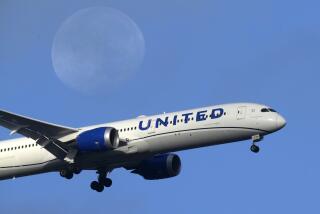Airline satisfaction: below post office, above subscription TV
Fliers are slightly more satisfied with the service offered by U.S. airlines than they were last year.
But with the airline industry ranked below the U.S. Postal Service for customer satisfaction, it still has a way to go.
The findings come from an annual survey of about 70,000 Americans and show that the airline industry ranks higher than only subscription TV and Internet service companies.
The American Customer Satisfaction Index, an independent benchmarking business developed at the University of Michigan, concluded that the industry improved 3% in 2013 to a rating of 69 on a 100-point scale. Not surprisingly, airline travelers are most turned off by crowded seating, extra fees and poor customer service, according to the report.
Low-cost carriers JetBlue Airways and Southwest Airlines led the industry with scores of 83 and 81, respectively; network airlines Delta, United, American and US Airways rated no better than 68, the survey found.
Industry officials defended the nation’s carriers, saying airfares have increased at only half the rate of inflation since 2000, even when accounting for those extra fees.
Airlines also compare favorably with other modes of transportation such as taxis, said Jean Medina, spokeswoman for Airlines for America, the trade group for the nation’s airlines.
For example, she said, the U.S. Department of Transportation received 1.18 complaints against airlines for every 100,000 passengers that flew in 2011. By comparison, New York city taxicabs got 3,125 complaints for every 100,000 passengers in that same year, she said.
“We have great numbers compared to other modes of transportation,” Medina said.
Two airlines raise bar for elite status
If you fly United or Delta airlines, it will cost you more next year to join one of the elite status groups on their loyalty reward programs.
Both airlines announced recently that it’s not enough to rack up miles to qualify for the top tier of the loyalty programs — passengers must also spend cash.
Delta became the first of the major airlines to add the requirement a few months ago, with United announcing the same requirement last week. The new requirements for both airlines take effect in 2014.
To reach the Silver status on United’s MileagePlus program, fliers must spend $2,500 directly on United, United Express or Copa airlines flights, plus have accumulated 25,000 miles or 30 flight segments on United or partner airlines. Elite loyalty status means fliers can upgrade to roomier seats, board early and avoid some fees that other passengers must pay.
Most MileagePlus members already meet the payment minimum, United spokesman Rahsaan Johnson said.
The spending requirement can be waived for U.S. members who spend at least $25,000 on their MileagePlus credit cards.
The amount that fliers must spend rises with each status level, such as Gold, Platinum and Diamond for Delta fliers and 1K for United passengers.
“The revenue component ensures that our most valued customers get the best program benefits and a more exclusive experience,” Delta spokeswoman Chris Kelly Singley said.
What does that mean?
Brian Kelly, an expert on loyalty reward programs who founded the website the Points Guy, said Delta and United may be trying to make the top tiers of their loyalty programs even more exclusive by pushing out the so-called “mileage runners” who take cheap flights to collect loyalty points.
“They are looking to weed out the fliers that are not producing for their bottom line,” he said.
European airline apologizes for no-cash policy
A European low-cost carrier apologized last week after imposing a no-cash policy for passengers wanting to buy onboard extras on new routes to New York and Bangkok, Thailand.
Most airlines in the U.S. already accept only credit cards for payment of onboard purchases.
But the hard-line policy at Norwegian Air Shuttle meant that a 16-year-old passenger who had no credit card and was flying from Oslo to New York could not pay for a blanket for the long flight. A woman flying from Thailand to Norway was reportedly refused food and water on the 12-hour flight because she also had only cash.
The airline apologized, saying it has changed its policy and will now accept cash on long-haul flights from those few passengers who don’t have a credit card.
“It’s crucial for Norwegian that our passengers enjoy their journey with us,” said Lasse Sandaker-Nielsen, a spokeswoman for the airline.
More to Read
Inside the business of entertainment
The Wide Shot brings you news, analysis and insights on everything from streaming wars to production — and what it all means for the future.
You may occasionally receive promotional content from the Los Angeles Times.










